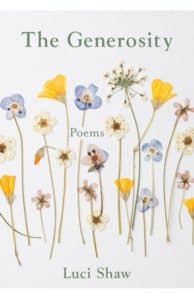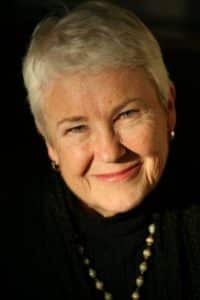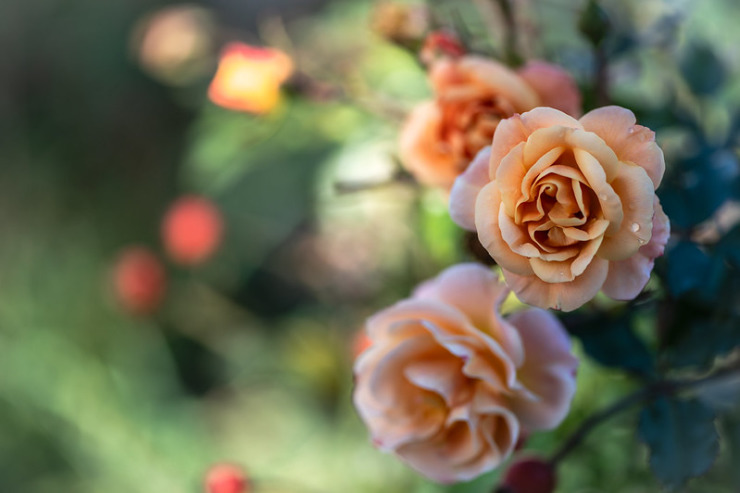Something I’ve seen in my own family: The young look forward to see where they’re going; the old look backward to understand.
That thought keeps rising in my mind as I read The Generosity: Poems, the latest collection published by Luci Shaw. If you’ve read any of her previous collections, like Harvesting Fog, Scape, or What the Light Was Like, you know she always has an eye on the eternal — in nature, in life, and in people. Even when that sense of the eternal isn’t obvious, it’s always there.
The same is true for The Generosity, with its 92 poems on subjects as diverse as dandelions and dementia. She finds the eternal wherever she looks; perhaps it’s in the DNA of all living things and the molecular structure of non-thing things. Wherever it is, Shaw finds it.
In this collection, she also finds something else, something that’s related to the eternal. That something is family. A number of the poems consider her own life, growing up, and her own family. In this poem, for example, one of many of my favorites in the collection, she blends her current life with memories of her childhood and parents.
Family of Origin

in the rooms of our lives.
Mine are long gone, but if it would
satisfy them I would take my heart
out of its cage and gift-wrap it
for their anniversary.
I glimpse them often, Dad reading
a book over my shoulder,
now and again offering words
of advice that might have made
sense fifty years ago. The words
form clots in my memory, cells
bright as blood, a private language
unlike any other.
My mother demanded mountains
of me. I managed to supply foothills.
They were lovely foothills, but
failure would hang in the air. We still
seem to meet in the heart of an odd
argument, words hanging unresolved,
glittering sparks in the dark air.
Sometimes, when I feel most wrong
about how to remember them, I am
most right, seeing them as they settled
into the grooves of my own memory.
I am my own narrative arc,
yet I arrange the candles and
flowers on my mantelpiece the way
my mother would have done it.
And for my father I still write
small poems, like the ones he
carried in his briefcase to
show his friends when
I was very young.
We carry more than our parents’ DNA; what Shaw is saying here is, even after they’re long gone, we still experience the influence of our parents, we still remember their criticism, and we still treasure their love and support. And it continues with our own children. In the passing on of ways of speaking and doing, the family jokes and upsets, the love and support as well as the mistakes, the family represents something eternal.

Luci Shaw
The poems are not all about family. Shaw turns her eye to nature, writing about rainfall, trees, birds, the sounds made by cows; to travel to places like Orcas Island and Willapa in Washington, the Cascades, and a lake in Colorado; and much more.
Shaw has published numerous poetry collections and several nonfiction books and edited three poetry anthologies. She’s co-authored three books with Madeleine L’Engle, and her essays have been widely anthologized. A graduate of Wheaton College in Illinois, she has been writer in residence at Regent College in Vancouver, Canada, since 1988. She lives in Bellingham, Washington.
With The Generosity, you want to sit outside in the early morning and read these poems aloud. You want to sit next to your father as he uses an eyedropper to feed baby birds whose nest fell out of the big cypress tree in the front yard. You want to stand patiently next to your mother as she finishes ladling the pie filling and hands you the spoon to lick. You’d like to forget the time your father stopped speaking to you, for no reason that was ever explained. That’s what Luci Shaw’s poems do.
Related:
Poets and Poems: Luci Shaw and “Scape”
Eating and Drinking Poems: Storytelling and Luci Shaw’s “Eating the Whole Egg”
Photo by NathalieSt, Creative Commons, via Flickr. Post by Glynn Young.
__________________________

“I require all our incoming poetry students—in the MFA I direct—to buy and read this book.”
—Jeanetta Calhoun Mish
- Longfellow’s “Paul Revere’s Ride”: Creating a National Legend - April 17, 2025
- Poets and Poems: Katie Kalisz and “Flu Season” - April 15, 2025
- Poets and Poems: Michelle Ortega and “When You Ask Me, Why Paris?” - April 10, 2025

Sandra Heska King says
I do love me some Luci! Harvesting the Fog was my first introduction to her. (I think you wrote a review.) Now she takes up a goodly section of a bookshelf.
laura says
I’m in need of some new poetry and your last paragraph has me convinced! I’ve always loved her words wherever I find them. These sound delicious.
Lane Arnold says
Evokes aches for more…more poetry to evoke more memories & creates the longing to write in such evocative ways.